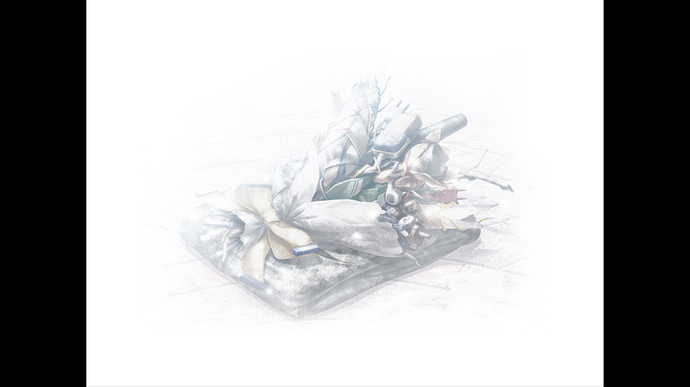What an experience.
Planetarian is my first venture into Key’s side-story projects, and right off the bat, I can tell how small and experimental it feels compared to most of the larger Key games. Since it is experimental, this novel has a lot of good and bad points.
Let’s start with the good ones. Planetarian is quite well-written, penned by the same guy who wrote Summer (which you can hear my thoughts about here). It’s quite a shame that this guy doesn’t get very much work at Key, but I guess he’s more comfortable writing shorter, more original stories. I felt that the serious and lighthearted moments were kept relatively balanced, and I felt the story got really dark at points. I felt that Suzumoto had quite a few messages he wanted to deliver with Planetarian, and I feel that said messages were well-delivered.
The story is very much focused on our two main characters: the nameless Junker and Yumemi. Their relationship felt a bit like a combination between Yukito and Misuzu from AIR, and Hiro and Baymax from Big Hero 6. One starts out rather annoyed by the other, they grow used to each other and help each other progress as individuals, and then one of the two dies, leaving the other to move on with his own life. Although the ultimate fate of the Junker and Yumemi is left up to interpretation, their whole relationship was both charming and touching. It’s such a shame that the novel ended so abruptly. 
Yumemi herself is full of personality, and quite easily steals the spotlight on multiple occasions. Despite her simple behavior and childlike, obedient personality, she’s quite the complex character. Her interaction with the environment is at one time rather amusing to watch, and at another staying quite true to the depressing, hopeless tone of the post-apocalyptic world around her. Despite her seeming obliviousness to the situation around her, she is very much aware of the fact that her caretakers and the customers are nowhere to be found, and are likely to have died. However, in her own way, she refuses to admit it, and with no one to blame, she is led to believe that it is her fault, rather than the result of fate. She is programmed to like and protect humans, so she can’t blame them for her circumstances, either. This conflict, as well as her desire to see through to her job even beyond the curtain of death, make her a solid character in my opinion.
Finally, Yumemi’s spritework is probably the most detailed I have ever seen in a Key game. It really helps make her as expressive and fits the given situation. I thought that the different-colored ribbons were quite amazing, and it makes me wish other Key games were as attentive to detail with their character sprites. Hopefully Harmonia can help scratch that itch… 
Okay, now for what I didn’t like. The game’s interface felt rather jarring and clunky compared to other Key games, and it took me a while to get used to. I like the idea of being able to jump from chapter to chapter, but it feels kind of redundant considering that visual novels have save slots. Oh, well.
Save for a couple of standout tracks, the soundtrack to Planetarian was largely forgettable and is quite easily the weakest soundtrack I have ever heard in a Key game. The title screen music, Gentle Jena, is quite soothing and it reminds me of a starry sky, so it sets the mood rather well. Another piece, titled ‘The Loving Depths’, has the exact same melody as a specific hymn that I occasionally sing in church, which I found quite interesting.
Finally, as impactful as Yumemi’s ‘death’ scene was, I felt it was a bit too long for its own good. I also spotted a spelling mistake and what feels like a missing voice clip, but those are nitpicks.
So, was this novel worth the $10 that I never paid in the first place? I’m going to say yes. Although it had its fair share of problems and has less content than a game like 100% Orange Juice, there’s enough good things about this visual novel to be worth the purchase. Special thanks to @Gnashes for acquiring the game for me, as well as @Yerian and the rest of the Kazamatsuri group for supporting me as I read this gem of a novel. You guys are awesome. 
I am satisfied with my care. :3

 And congratulations to our winner of the competition!
And congratulations to our winner of the competition!


